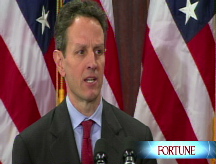Tough week, but Obama gets his bill
In his 4th week in office, the president unveiled his bank bailout and turned up the heat on stimulus. Next he will sign the recovery plan and take on housing.
NEW YORK (CNNMoney.com) -- President Obama got his stimulus bill on time. But it wasn't pretty.
The House and Senate approved the measure Friday, after a compromise was struck earlier in the week. Most Republicans in Congress still staunchly oppose it, and many Democrats are upset about some of the spending plans that were stripped out of it.
Still, the stimulus package was completed by the start of the Presidents Day weekend, the deadline set by Democratic leaders.
Though the Obama administration cleared a difficult hurdle, the rescue efforts are hardly over. Obama called stimulus one leg on a multi-legged stool of economic recovery plans: Financial sector stability, tighter regulation and housing remain.
With stimulus out of the way and an outline of the financial sector rescue announced on Feb. 10, the pressure is on the Obama administration to move its housing plan to the top of its agenda. The president pledged to spend at least $50 billion to help borrowers in trouble, and Treasury Secretary Tim Geithner said the administration would release its plan within a few weeks.
But lawmakers and Wall Street reacted poorly this week when details of a comprehensive foreclosure plan weren't announced.
CNNMoney.com will continue to track Obama's first 100 days in office and keep score of the government's unprecedented efforts to fix the ailing economy. (Last week's article is available here.)
Bank bailout do-over: On Tuesday, Treasury Secretary Tim Geithner detailed the Obama administration's plan to rescue the financial sector, calling the government's previous efforts "inadequate."
Though Geithner later appeared before the House Financial Services Committee and said his plan was "fundamentally different" from his predecessor's efforts, Wall Street didn't buy the change, and stocks sold off in force.
Analysts applauded many of the reforms, including added transparency and the government's plan to commit more than $1 trillion in financing for consumer and business loan purchases. But critics said the plan was woefully lacking in details, especially in its foreclosure mitigation proposal. Others said the plan didn't go far enough to ensure banks use rescue funds for lending.
Geithner went before the Senate Budget Committee on Wednesday to defend his plan, but the committee warned him that Treasury needs to provide details - especially on housing - very quickly.
Stimulus deal reached: Key lawmakers in the Senate and House reached a compromise deal on a $790 billion economic recovery package on Wednesday. After some horse trading later in the week, the final top-line price tag was $787 billion.
Both chambers of Congress entered negotiations after the Senate passed its version of the bill on Tuesday in a 61-to-37 vote, with only three Republicans voting in favor - Sens. Susan Collins and Olympia Snowe of Maine and Sen. Arlen Specter of Pennsylvania.
The House had planned to vote on the package Thursday, but delayed its vote until Friday after many Democrats expressed displeasure with many of the spending cuts. On Friday, the House approved the measure 246-to-183, with no Republicans voting in favor.
The Senate passed the measure with 60 votes late Friday night.
Housing plan uncovered: Sources revealed Thursday that the Obama administration is working on a plan to help borrowers before they default on their mortgages.
Obama, Geithner and Housing Secretary Shaun Donovan met with banks, housing advocates and trade organizations this week to work out the administration's foreclosure mitigation package.
The president's plan, which may be announced on Wednesday, would have servicers adjust the terms of a borrower's loan without having the mortgage's investors take a loss. Struggling homeowners would have to take an affordability test and undergo a re-appraisal to see if they are eligible.
Markets rebounded to about the breakeven mark on the news, after falling to three-month lows earlier in the day.
Obama takes stimulus pitch on the road: President Obama traveled early this week to two communities that have been particularly hard hit by the economic recession.
On Monday, Obama traveled to Elkhart, Ind., a city that has seen its unemployment rate triple to more than 15% over the past year. On Tuesday, the president went to Fort Myers, Fla., which has one of the highest rates of foreclosure in the nation.
Obama held town hall meetings in both locations, making another push for his economic stimulus plan. He said the plan will aid both towns by helping to create or save millions of jobs and providing tax relief to middle- and low-income workers.
President in prime time: Obama returned to Washington after his Monday trip to Elkhart to deliver his first prime-time news conference. The president used the stage to make his case to Congress to reach an agreement on the economic recovery plan.
"It is absolutely true that we cannot depend on government alone to create jobs or economic growth. That is and must be the role of the private sector," Obama said. "But at this particular moment, with the private sector so weakened by this recession, the federal government is the only entity left with the resources to jolt our economy back to life."
Gregg withdraws nomination: A week after Obama announced Sen. Judd Gregg, R-N.H., as his pick for Commerce secretary, Gregg withdrew his nomination Thursday, citing "irresolvable conflicts" with the stimulus bill.
Gregg became the second Commerce secretary-designate to step down. New Mexico Gov. Bill Richardson withdrew from consideration last month. Health and Human Services secretary-designate Tom Daschle withdrew his nomination last week. ![]()



